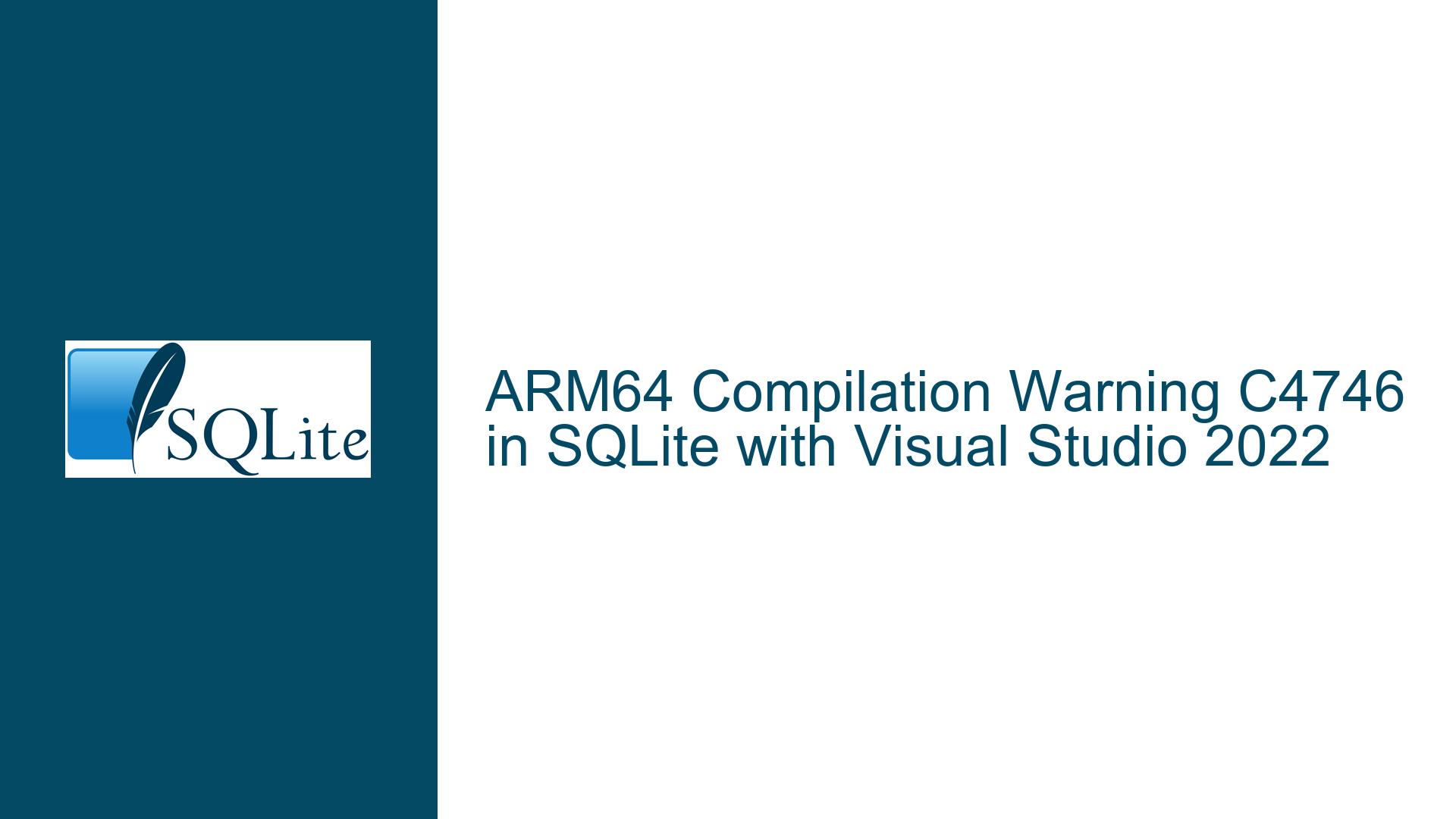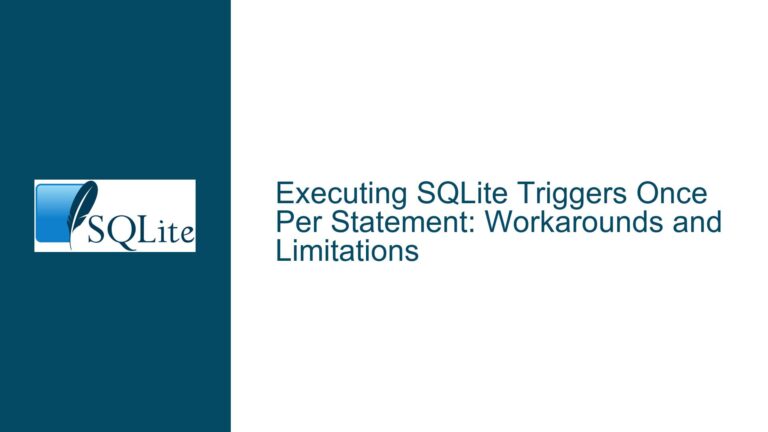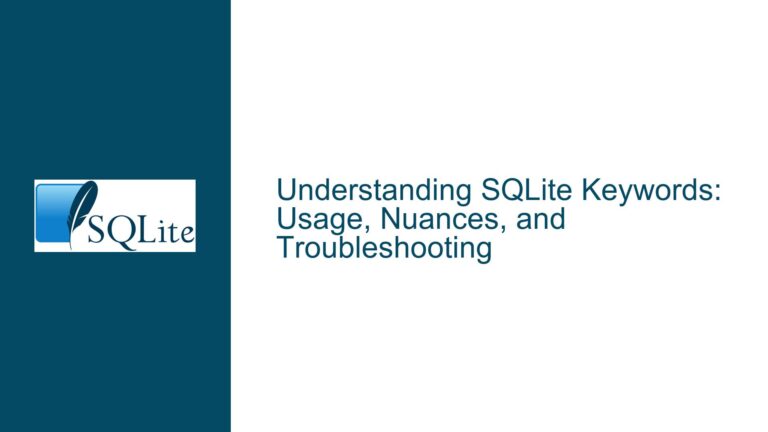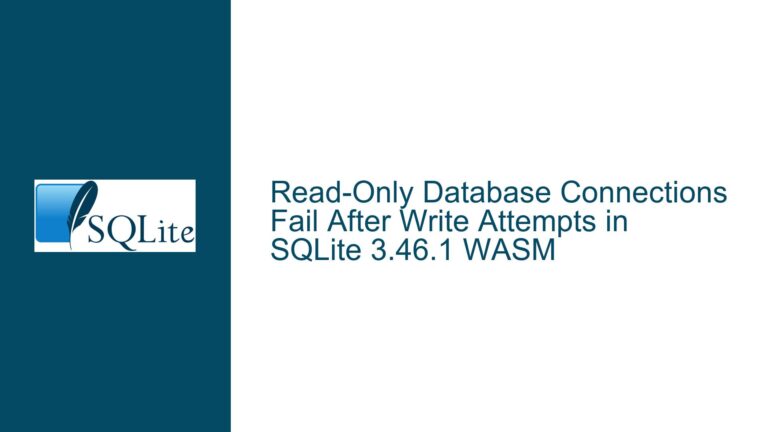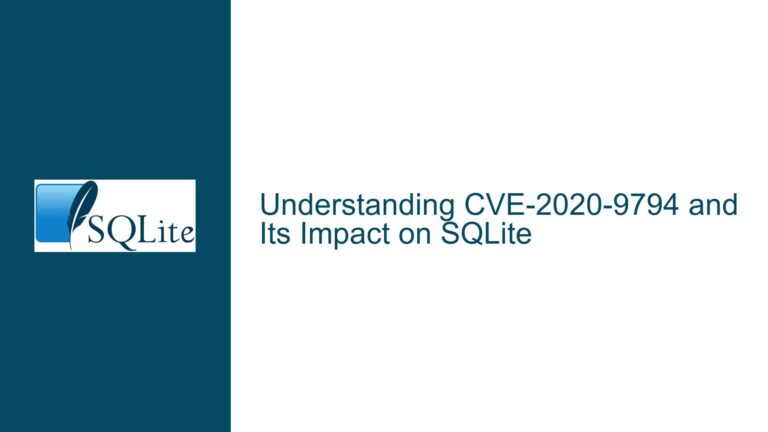ARM64 Compilation Warning C4746 in SQLite with Visual Studio 2022
Issue Overview: ARM64 Compilation and Volatile Access Warnings in SQLite
When compiling the SQLite amalgamation source code using Visual Studio 2022 for ARM64 architectures, developers may encounter the compiler warning C4746. This warning is triggered due to the volatile access of certain expressions in the SQLite codebase. The warning message explicitly states that the volatile access is subject to the /volatile:<iso|ms> setting and suggests using __iso_volatile_load/store intrinsic functions as an alternative. The core issue revolves around whether SQLite is designed to function correctly without the additional memory fences that are introduced when the /volatile:ms mode is enabled. If SQLite is indeed designed to work without these memory fences, then the warning can be safely suppressed using a #pragma warning directive. However, if the volatile accesses are critical for the correct functioning of SQLite under ARM64, then the code may need to be modified to ensure proper memory ordering and synchronization.
The warning C4746 is particularly relevant in the context of ARM64 architectures, where memory consistency models can differ significantly from those in x86 or x64 architectures. ARM64 employs a weakly-ordered memory model, which means that memory operations may be reordered by the processor unless explicit memory barriers or fences are used. The /volatile:ms setting in Visual Studio enforces a stricter memory model that is compatible with the x86/x64 memory ordering, but this may not be necessary or optimal for ARM64. The warning suggests using __iso_volatile_load/store intrinsics, which provide a more controlled way to handle volatile accesses without imposing unnecessary memory fences.
The issue is further complicated by the fact that SQLite is a highly portable database engine that is designed to run on a wide variety of platforms and architectures. The use of volatile variables in SQLite is typically intended to ensure that certain memory operations are not optimized away by the compiler, particularly in multi-threaded contexts. However, the exact semantics of volatile accesses can vary between different compilers and architectures, which can lead to subtle bugs or performance issues if not handled correctly.
Possible Causes: Volatile Access Semantics and ARM64 Memory Model
The warning C4746 is indicative of a potential mismatch between the volatile access semantics assumed by the SQLite codebase and the memory model enforced by the ARM64 architecture. The volatile keyword in C/C++ is often used to prevent the compiler from optimizing away memory accesses that may be modified by hardware or other threads. However, the exact behavior of volatile accesses can vary depending on the compiler and the target architecture. In the case of ARM64, the weakly-ordered memory model means that volatile accesses alone may not be sufficient to ensure the correct ordering of memory operations, especially in multi-threaded scenarios.
One possible cause of the warning is that SQLite may be relying on the stricter memory ordering guarantees provided by the x86/x64 memory model, where volatile accesses are sufficient to ensure visibility of changes across threads. On ARM64, however, additional memory barriers or fences may be required to achieve the same level of memory consistency. The /volatile:ms setting in Visual Studio enforces a memory model that is compatible with x86/x64, but this may introduce unnecessary memory fences that could degrade performance on ARM64.
Another possible cause is that the SQLite codebase may not have been explicitly optimized for ARM64 architectures, particularly with respect to the use of volatile variables. While SQLite is designed to be highly portable, there may be certain assumptions about memory ordering that are implicit in the codebase. These assumptions may hold true on x86/x64 but could lead to issues on ARM64 if not properly addressed.
The use of __iso_volatile_load/store intrinsics is suggested by the warning as a way to provide more explicit control over volatile accesses. These intrinsics allow developers to specify the exact memory ordering semantics required, which can help avoid unnecessary memory fences while still ensuring correct behavior. However, modifying the SQLite codebase to use these intrinsics would require a thorough understanding of the memory ordering requirements of the code and could introduce additional complexity.
Troubleshooting Steps, Solutions & Fixes: Addressing Volatile Access Warnings in SQLite on ARM64
To address the warning C4746 when compiling SQLite for ARM64 in Visual Studio 2022, developers can take several steps to ensure that the code is both correct and efficient. The first step is to determine whether the volatile accesses in the SQLite codebase are critical for correct behavior on ARM64. This can be done by reviewing the relevant sections of the code and understanding the intended memory ordering semantics. If the volatile accesses are not critical, then the warning can be safely suppressed using a #pragma warning directive.
If the volatile accesses are critical, then the next step is to determine whether the /volatile:ms setting is necessary or whether the __iso_volatile_load/store intrinsics can be used instead. The /volatile:ms setting enforces a stricter memory model that is compatible with x86/x64, but this may introduce unnecessary memory fences on ARM64. Using the __iso_volatile_load/store intrinsics allows for more fine-grained control over memory ordering, which can help avoid these unnecessary fences while still ensuring correct behavior.
To implement the __iso_volatile_load/store intrinsics, developers will need to identify the specific volatile accesses that are triggering the warning and replace them with the appropriate intrinsic functions. For example, a volatile load can be replaced with __iso_volatile_load, and a volatile store can be replaced with __iso_volatile_store. This requires a thorough understanding of the memory ordering requirements of the code and may involve significant changes to the codebase.
Another approach is to use memory barriers or fences explicitly where needed, rather than relying on volatile accesses. This can provide more explicit control over memory ordering and can help avoid the issues associated with volatile accesses on weakly-ordered architectures like ARM64. However, this approach also requires a deep understanding of the memory model and may introduce additional complexity.
In some cases, it may be necessary to consult the SQLite documentation or reach out to the SQLite development community for guidance on how to handle volatile accesses on ARM64. The SQLite codebase is highly portable and has been optimized for a wide variety of platforms, so there may be existing solutions or best practices that can be applied to this issue.
Finally, it is important to thoroughly test any changes to the codebase to ensure that they do not introduce new issues or regressions. This includes testing for correct behavior in multi-threaded scenarios, as well as performance testing to ensure that the changes do not degrade performance on ARM64.
In conclusion, the warning C4746 when compiling SQLite for ARM64 in Visual Studio 2022 is indicative of a potential mismatch between the volatile access semantics assumed by the SQLite codebase and the memory model enforced by the ARM64 architecture. By carefully reviewing the code, understanding the memory ordering requirements, and making appropriate changes, developers can address this warning and ensure that SQLite runs correctly and efficiently on ARM64.
